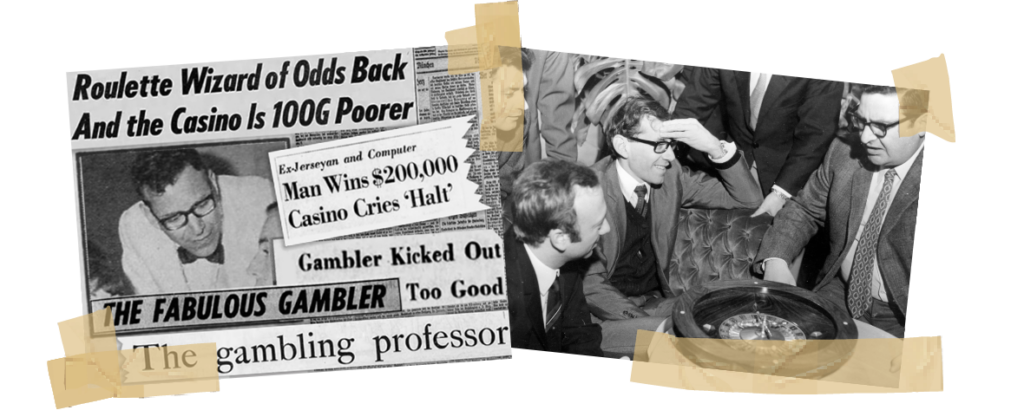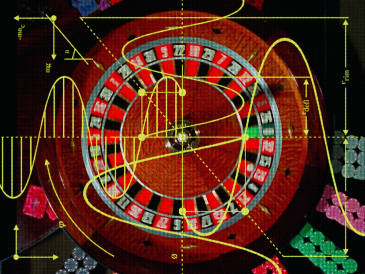Roulette is a game of chance, where each spin of a wheel can lead to fortunes. While many consider it purely a game of luck, intriguing individuals have managed to tilt the odds in their favor through skill, mathematics, and determination. Today, we explore whether it’s possible to beat the wheel, both in the past and the modern era.

Richard Jarecki: Mastering the Roulette Wheel of the past
Richard Jarecki, a German doctor, had a preference for numbers and an unwavering determination to outwit the wheel. Dr. Jarecki’s journey began when he discovered that specific spins in European casinos had imperfections that caused them to favor particular numbers. On a perfect wheel, the ball would always land randomly.
However, with time, wheels develop flaws that create patterns. Even a slightly tilted wheel could create what experts call a “drop zone.” When the tilt forces the ball to climb a slope, it slows down and consistently falls from the outer rim at nearly the same spot on each spin. This can occur due to wear and tear or factors like residue from a croupier’s hand lotion. The drop zone becomes a vulnerability, providing enough predictability for technology to compensate for the random bouncing after the ball drops.

With this knowledge, he meticulously recorded thousands of spins, analyzed the data, and identified the biased numbers. With nerves of steel, he placed his bets strategically on those numbers, leading to impressive winning streaks. Richard Jarecki’s story became legendary, demonstrating that it was possible to beat the wheel with patience, observation, and a deep understanding of the game.
Expertise at Ritz Club Casino and beyond
One of his most memorable victories occurred at London’s Ritz Club, where he won. Substantially. The Ritz’s wheels became the subject of intense observation, with owners inspecting their equipment for potential biases. Jarecki’s exploits were more expansive as he crisscrossed Europe, leaving them wondering how to protect their profits.
Jarecki made his mark in San Remo, an ancient casino with well-worn roulette wheels. One night in 1968, Jarecki stepped into the casino and, to the amazement of onlookers, walked away $48,000 richer for three days. Not content with this triumph, he returned eight months later and departed with an astonishing $192,000 winnings from a single weekend.
His winning streak caught the casino’s attention, leading to his banishment. However, when the ban was lifted, Jarecki returned triumphantly and pocketed another $100,000.
Ultimately, they faced a significant dilemma. The wear and tear on their 24 wheels was undeniable, and it became more cost-effective to replace them all despite the substantial expense.
Niko Tosa: The Modern Roulette Strategist
Fast forward to the present day, technology has played a crucial role in leveling the playing field, yet the spirit of innovation persists.
One such innovator is Croatian physicist Niko Tosa. This man dared to defy the odds, the power of roulette computers, and artificial intelligence by analyzing the outcomes of this game of luck.

One evening, three individuals entered the Ritz Club Casino in London’s West End. Ritz security team paid attention to their leader, Tosa. Casino workers greeted them with quiet respect.
Tosa had recently visited the Ritz Casino half a dozen times, leaving with substantial winnings each time. Staff admired his success, with one manager calling him the most successful player he’d witnessed in 25 years. Casino inspected a wheel he’d played on but found no signs of tampering.
On that night in March 2004, Tosa and his companions, a Serbian businessman and a bottle-blond Hungarian woman, sat at a table in the Carmen Room at the table’s end. The wheel spun silently, illuminated by a glistening golden chandelier. Armed with his intellect and a device known as the roulette computer, their unusual strategy involved waiting a few seconds after the ball’s launch, then rapidly placing bets on up to 15 numbers – a tactic that stood out even at the Ritz.
They preferred “neighbors” bets, covering one number and its two adjacent numbers, while playing the standard European wheel with 37 red and black pockets and a single green 0. As their chip stack grew higher, security staff watched nervously. How Tosa and his friends played roulette stood as unconventional, even by Ritz Casino standards.
Unlocking the Secrets of Roulette Wheels: Tosa’s Unique Approach

Tosa’s approach differs from Jarecki’s, as he doesn’t rely on wheel imperfections. Instead, he seeks patterns and trends in the game’s outcomes, aiming to predict the following winning numbers based on historical data.
Predicting where the ball will land on a flawless table should be practically impossible. However, factors like table imperfections or a slight tilt make the ball’s spin more predictable, creating a “drop zone” where it’s more likely to settle.
Even physicist Doyne Farmer, whose roulette prediction exploits are documented in The Eudaemonic Pie and who designed such a device, suggests this feat alone might be possible. Or as Farmer puts it,
“It’s possible for someone to replicate our approach without a roulette computer, as long as the wheel is tilted and the rotor isn’t spinning too fast.”
The ever-present house edge
Despite the remarkable stories of individuals like Richard Jarecki and Niko Tosa, it’s essential to remember that casinos are not in the business of losing money.
The casino wheel is designed with a built-in advantage for the house, commonly known as the house edge. This mathematical edge ensures that, over time, the casino will profit.
While gaining short-term advantages through biased wheels, computers, or cutting-edge technology may be possible, business edge ultimately prevails. Achieving consistent success against the wheel continues to be a challenging endeavor.
Richard Jarecki and Niko Tosa remind us that human ingenuity knows no bounds. However, the casino business edge remains an obstacle. Despite gamblers inventing complex mathematical systems like Oscar’s Grind and the D’Alembert or more uncomplicated strategies like doubling bets on black after a loss, casino owners love these tactics because they’re ultimately ineffective.
Behind the Roulette Table: Legends and Lore of Defying the Odds
The next time you place your bets at the table, remember the legends who dared to defy the odds and the casinos who meticulously protect their profits. While beating the wheel may remain a distant dream, the thrill of the game and the possibility of winning extensively continue to captivate players worldwide.
